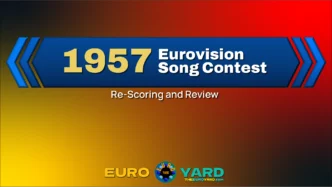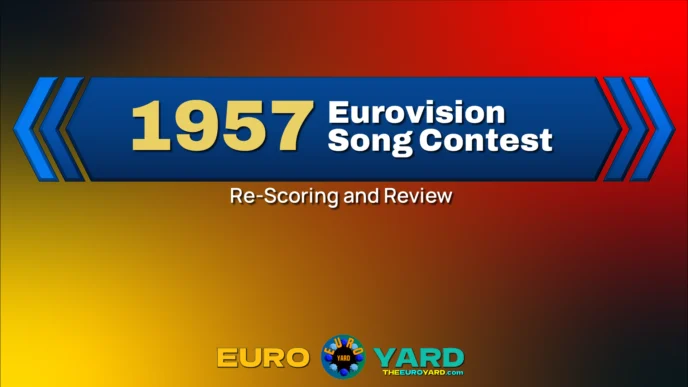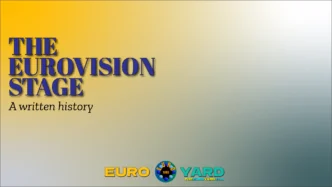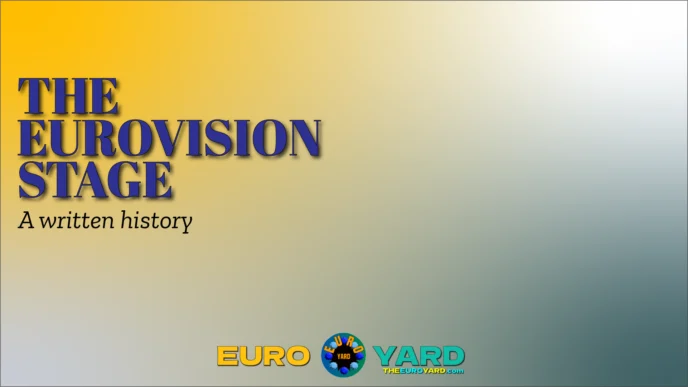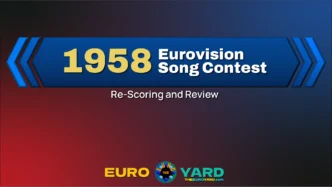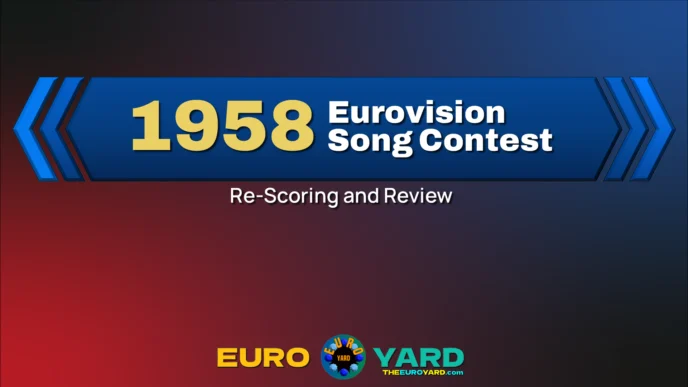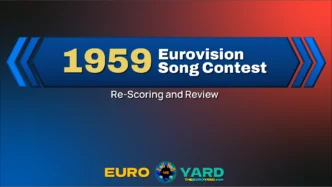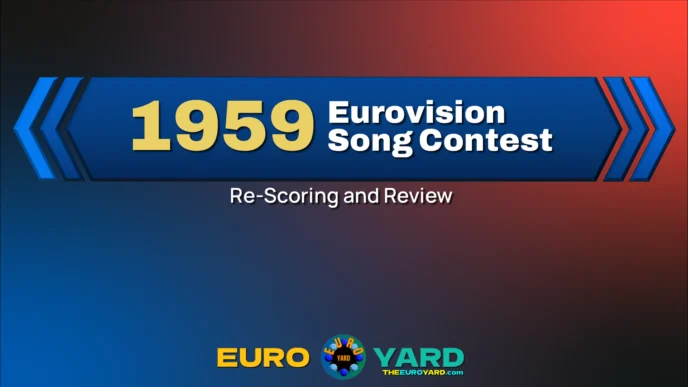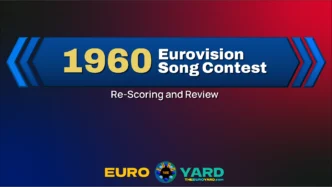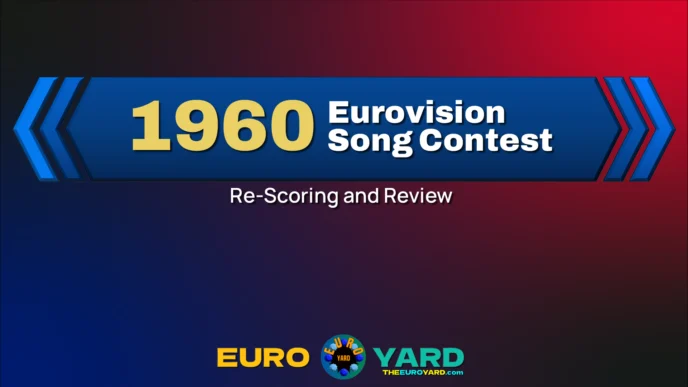It all started in Lugano, Switzerland with the Eurovision Song Contest 1956. We know who won, but how did we rate all 14 contenders?
This is the first of many decades of Eurovision Song Contests, with the only skip between now and the present day being in 2020. The contest is almost as old as the post-World War peace, having come just 11 years after 1945. It is a part of European culture, now and forever, but every big event has to start somewhere.
PLEASE NOTE: As of March 2025, the rankings below are obsolete. To view the updated rankings for 1956, please visit this article.
The Story Behind Eurovision Song Contest 1956
The first Eurovision Song Contest was held on 24 May 1956 in Lugano Switzerland. Its venue was Teatro Kursaal, which today is known as Casinò Lugano. These proceedings were modeled off of the success of Italy’s famed Sanremo Music Festival, which began earlier in the decade.
In what should not be a surprising fact, it was also the smallest “grand prix de la chanson,” featuring just seven countries: Belgium, Germany, France, Italy, Luxembourg, The Netherlands, and Switzerland. Due to its small size, this was also the sole Eurovision Song Contest in which each country performed twice. Some nations had different singers perform each number, but others allowed both to be sung by the same person. This is how, for example, Lys Assia has four Eurovision entries despite appearing in the contest in three years.
The scoring system used in the Eurovision Song Contest 1956 would not resemble anything employed in the modern day, and this is also the only contest in which the results are not fully available. All we know is the winning song, but not how the other thirteen songs placed. We also do not know any details of points scored, margins of victory, and so forth.
Finally, this is also one of two contests in which no tape of the whole program exists, the other being 1964. Don’t bother searching YouTube.
Eurovision Song Contest 1956: Our Scoring
Standings from 14th to first will be revealed in reverse order, starting with 14.
Please Note: We developed a new scoring rubric following the 2024 Eurovision Song Contest, to be used in rating all contests. The below was re-scored in May 2024.
14th Place
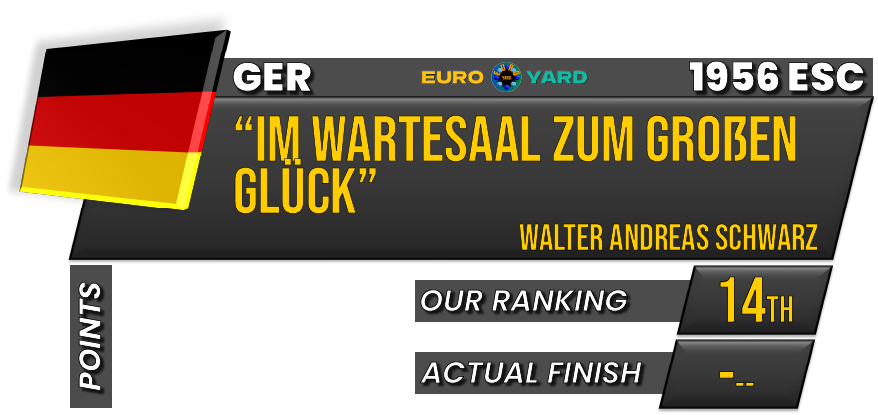
Sorry, Germany. We rated Walter A. Schwarz’s song, Im Wartesaal zum großen Glück, last in our 1956 rankings.
It may have been in line with some of the music of the time, but so were other songs, and I liked them a lot better. There was some Shatner-esque speak-singing going on here, and I could not justify giving it a high score. Kind of a rough start for Deutschland.
Schwarz’s song was performed fourth in the running order.
13th Place
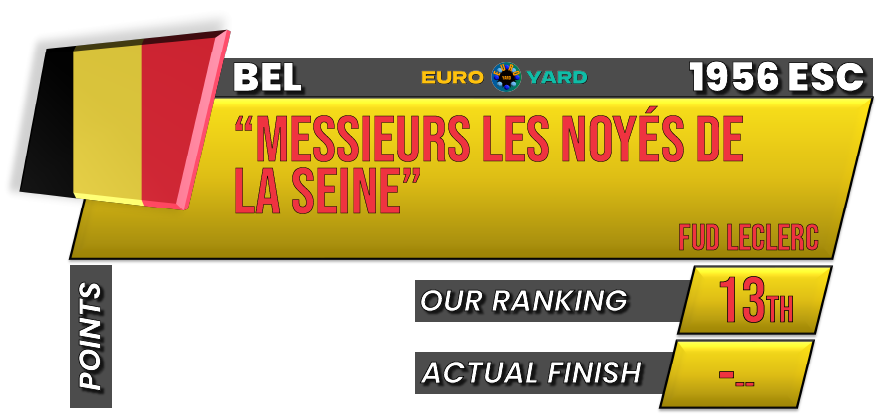
We have Belgium’s Messieurs les noyés de la Seine by Fud Leclerc in 12th place.
Leclerc will be back in future Eurovisions, and if I had known this in 1956 (or been alive at the time), I’m not sure how I would have felt about it. His musical style is not for me. This particular song – and you can tell it came before the three-minute-song rule – was slow-moving, and much like the Luxembourg song down near the bottom with it, it seemed to go nowhere.
This was the third Eurovision song ever performed.
12th Place
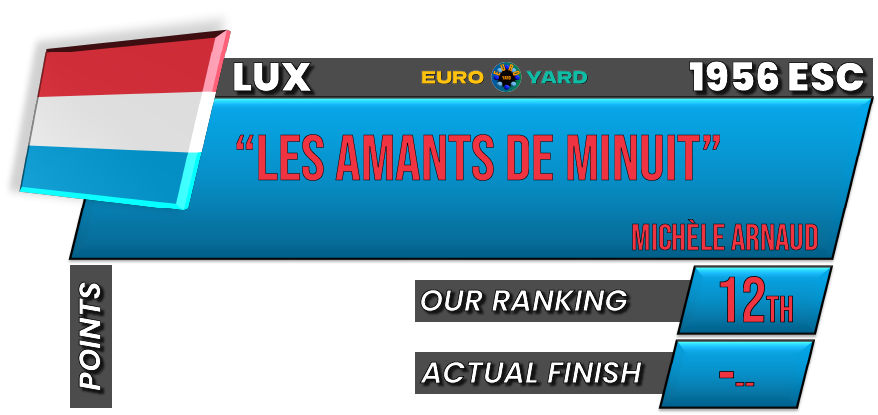
Third from the bottom in the inaugural ESC was Les amants de minuit, one of Luxembourg’s two entries. Both of them were sung by the same person, Michèle Arnaud. One of them made our top ten, and this one (obviously) did not.
My primary critique of this song is that it was a little dull. Arnaud sang just fine, but the performance never seemed to reach any sort of second level. I was expecting that the song was building to something, like a noteworthy crescendo, but it did not get there. This was not memorable aside from being one of Luxembourg’s first entries.
Les amants de minuit was performed second to last in the show, in thirteenth position. In our original scoring, this song and Fud Leclerc’s were reversed.
11th Place
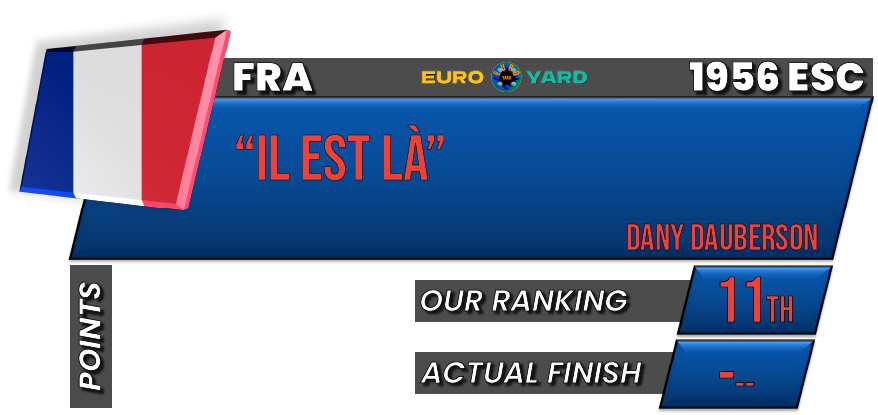
In 11th place, just outside scoring points, is Dany Dauberson’s Il est là, which translates from French to “he is there.” It was one of the later songs in the contest, going in 12th position.
We’re back to some tempo here, as Dauberson gave an upbeat performance. I don’t know that the vocals were for me at times, and I have to admit, on the re-listen with the new scoring rubric, I remember this one being better. For whatever reason, it did not land with me quite as strongly the second time though, and it narrowly missed the top ten. Keep in mind that I thought very little was what I would consider bad or sub-par in 1956; most of them were good singers and countries sent their best. Tough year to get near the top.
Top 10: Point-Scorers
Please note: We use the 12, 10, 8-1 points scoring system from the present for all Eurovision Song Contests.
10th Place
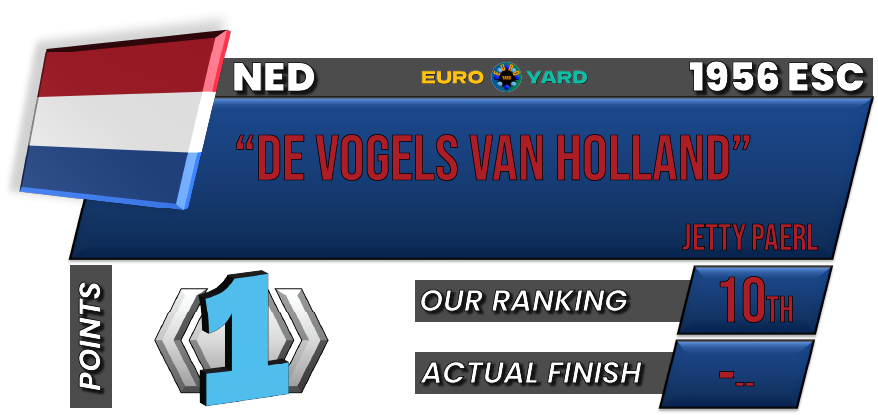
Jetty Paerl of The Netherlands placed tenth (1 point) on our list with De vogels van Holland. Of course, this song has an historic distinction: it was the first Eurovision Song Contest entry ever performed.
“The birds of Holland” was a pretty number and I appreciated that Paerl made her song about her home country. In the end, that’s part of the joy of Eurovision: those things that make the dozens of countries which today participate unique. This song was higher on the initial scoring, seventh place, but it was clearly outshined by some other numbers in 1956.
Like the vast majority of Eurovision Song Contest 1956 performers, sadly, Jetty is no longer with us, having lived into her 90s and passing away in 2013.
9th Place
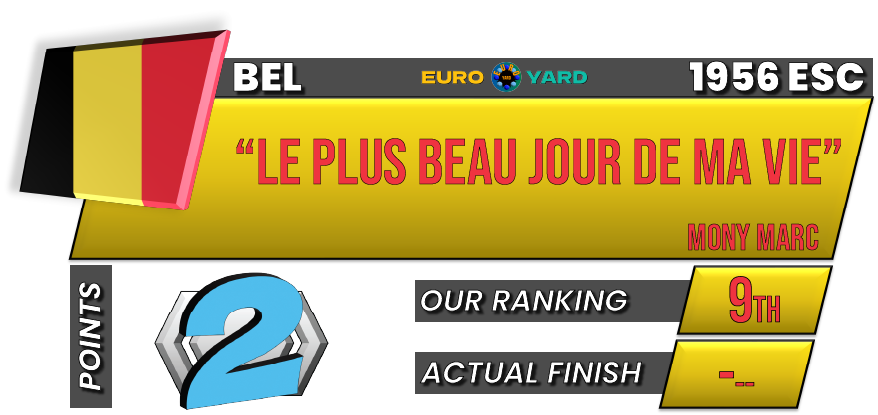
Sitting in 9th place (2 points) is one of Belgium’s entries by Mony Marc, Le plus beau jour de ma vie. This might be a song identifiable by a famous phrase, and honestly, it’s surprising that “ding-dong” is not somewhere in the title of the song, which translates in English to “the best day of my life.”
Why was it the best day of Mony Marc’s life? After all, she didn’t win the Eurovision Song Contest 1956, though there are rumors that she did well with the juries. She sang well, and the lyrics make it clear: she’s getting married to a charming prince. Good for her. Was it my favorite, no, but it was good enough.
Marc performed in 10th position, right after Lys Assia’s winning song.
8th Place
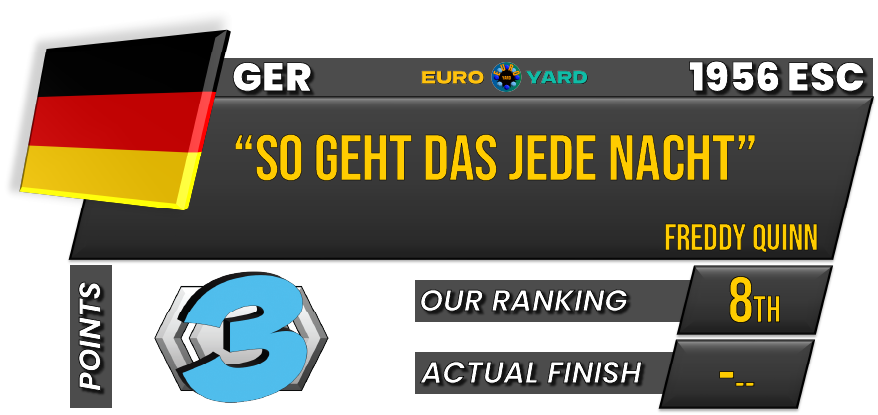
With our new scoring system, a wrong has been righted from the first go-around, and Germany has points for one of its songs. So geht das jede Nacht by Freddy Quinn ranked 8th on our list, taking 3 points on the all-time scoreboard.
If there were a compliment I could pay to this song, it would be for its creativity and its fun beat. I was not taken with his singing, which is why it did not end up higher, but at least this was an upbeat tune. In fact, I wanted to like this one more but it needed some refinement. It was a fun listen nevertheless.
The good news is that Quinn is still with us as of 2024, having retired from singing about 15 years earlier. His song came towards the end of the 1956 contest in 11th position.
7th Place
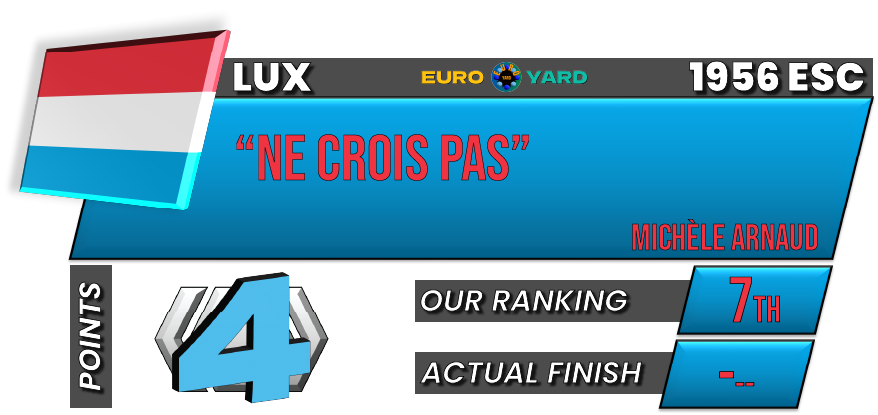
Luxembourg scored with Michèle Arnaud’s other song, Ne crois pas, landing in 7th place on our list (4 points). This was her first song, at least as far as the running order goes; it was performed sixth.
This had a little bit of tempo, which though not unheard of in this Eurovision era was also far from a guarantee. Arnaud sang both entries for Luxembourg, and this was the superior one. While I found the other entry a little boring, this one was not, featuring a faster beat and dare I say it was a bit catchy. She earned those four points, and I liked it better on the re-listen.
6th Place
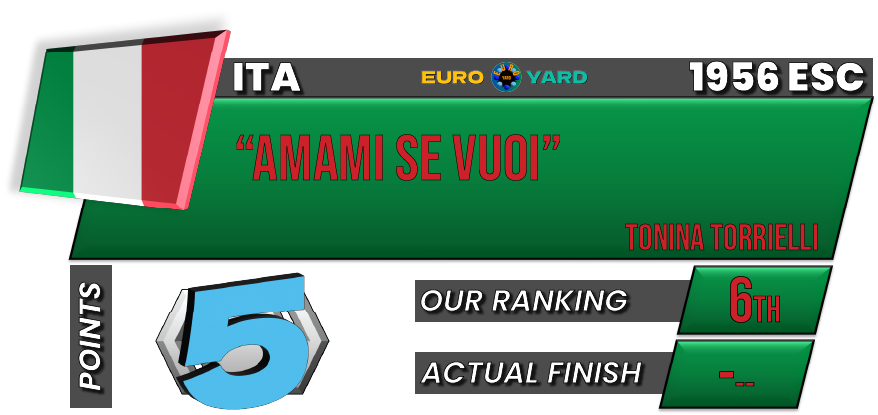
Italy scored five points with Amami se vuoi, Tonina Torrielli’s song, which means “love me if you want.”
Her vocals were quite beautiful, which is most of why she scored so highly on our list. I also appreciated the extended instrumentals towards the end of the song, which I imagine would not be a thing today because she would have about 45 seconds to slice off of this number.
An interesting thing happened with Italy on the re-score: We had this song higher than Italy’s other entry the first time, but on the new listen, it came in a little lower. Both entries were worthy of the top ten.
Torrielli, who was 22 at the time she represented Italy at Eurovision, is reportedly still alive as of 2024. Her song went last in the running order at 14th.
5th Place
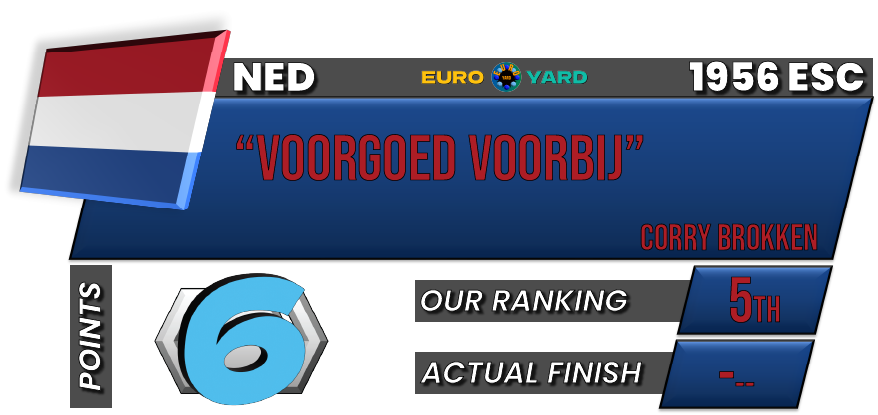
On this website, we are fans of Corry Brokken. Future rankings will also be quite kind to her, a future Eurovision winner. In this, her first effort, she came in fifth place on our list (6 points) with her song Voorgoed voorbij, which means “gone forever.” As far as Eurovision history goes, Brokken is certainly not forgotten.
She had a powerful and clear voice. Lack of enunciation is something that irritates me in Eurovision throughout the decades, but Brokken did not have that problem. I do not speak Dutch and have no idea what the hell she’s saying, but she sings it with clarity.
We know Brokken was the second Eurovision winner, but 20 years after this performance, she would become the first former Eurovision act and winner to host the show. Ironically, she was not a singer anymore by then, but rather an attorney.
4th Place
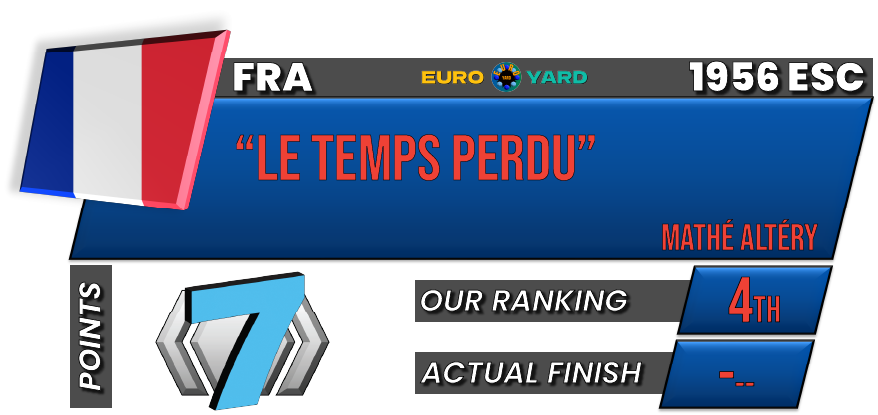
Le temps perdu, otherwise known as “lost time,” got our fourth place in the 1956 contest for France.
Altéry has a great voice with impressive range, and it was on display for all three minutes of her performance. Yes, it’s another love song – Eurovision has never been hurting for more of those, even back to the beginning – but the imagery here is poignant. She’s been left by her true love, hence the lost time, but we go from fire to water to monotony. It covers a lot of ground, to be sure.
As of 2024, Altéry is one of the only Eurovision Song Contest 1956 performers still alive, at the age of 96.
3rd Place – Bronze Medal
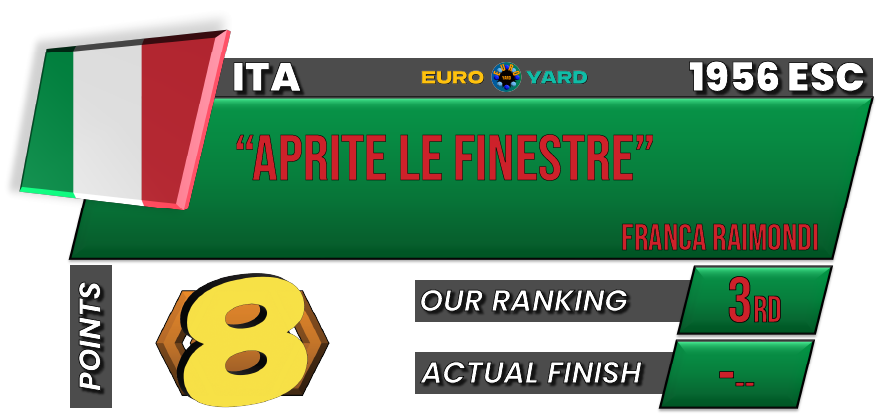
Eight more points going to Italy to make for a very good first contest. Franca Raimondi scored in third place on our list with Aprite le finestre, which translates to “open your windows.”
Raimondi had a pretty voice, as a number of singers back in this day did (you know, actually singing). She won the 1956 Sanremo Music Festival with this song, which I liked less than Amami se vuoi the first time, but more the second time. Funny how these things work.
Raimondi was in the middle of the running order at seventh.
2nd Place – Silver Medal
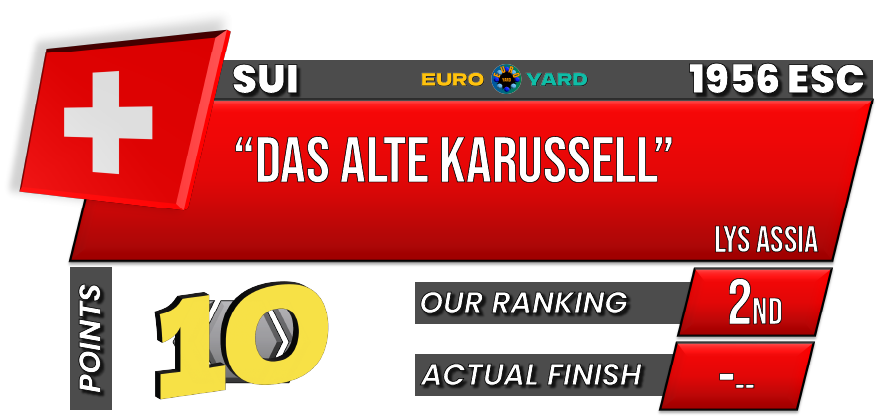
Lys Assia, the original queen of Eurovision, took both second and first place in our 1956 rankings. She represented Switzerland with two songs, this one being the first: Das alte Karussell, which is German for “the old carousel.”
I can promise more articles about Lys Assia and several of her performances, including this one, as she is one of the most important figures in Eurovision history. This is not a fact up for debate, either. If you consider yourself a fan of the Eurovision Song Contest but are unfamiliar with Assia’s contributions, now is a good time to learn.
As for this song, which went second in the running order, it was a long one (about four minutes), but her voice is so, so pure. I almost liked this better than Refrain. Speaking of…
1st Place – Gold Medal
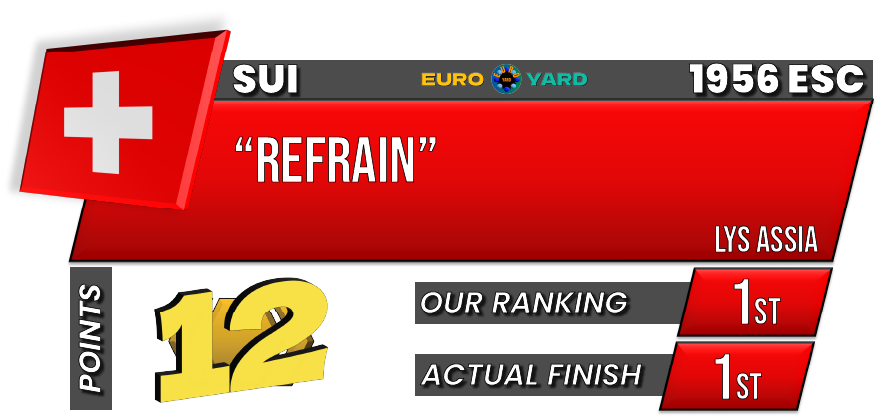
Here is your first winner of the Eurovision Song Contest: Lys Assia’s Refrain, performed ninth in the running order in 1956. Unlike just about everything else from this contest, there is video of it online, at least of her winner’s reprise. She had backing singers and everything – something that fans of Eurovision would take for granted today, but which stood out in the contest’s evolutionary phase.
I will point out that both of Assia’s entries were in a different language – while Das alte Karrusell was in German, this was in French, another Swiss national language. She would later perform at Eurovision in a third language, Italian. Hard not to find that impressive.
The same affirmations apply in this song as in her first: fantastic voice, captivating performer.
Euro Yard All-Time Scoreboard: Through 1956
Image enlarges upon clicking.
| Switzerland | 22 |
| Italy | 13 |
| France | 7 |
| The Netherlands | 7 |
| Luxembourg | 4 |
| Germany | 3 |
| Belgium | 2 |



